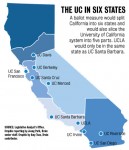A ballot initiative to split California into six states reached the threshold of signatures needed to be included on the November 2016 California election ballot. If it passes, the initiative will have significant ramifications for the University of California, experts said.
About 1.3 million California residents have signed onto the “Six Californias” initiative since proponents began collecting signatures in February, said venture capitalist Tim Draper, who created the initiative. If the initiative passes in the 2016 election, the state and federal legislatures both have to approve the change as specified by Article IV of the U.S. Constitution.
The proposal would limit access to the UC for all California students, said Hans Johnson, a senior fellow at the Public Policy Institute of California. If the state is split up, universities like UCLA could charge out-of-state tuition for students from areas such as Central California, he said.
“Students who live outside UCLA … would presumably not have the same kind of access as they have right now,” Johnson said. “Unless there’s some accommodation made, we can expect to see access … lessened by the proposition.”
According to the proposal’s language, Los Angeles County would be a part of West California, which covers southern coastal counties such as Santa Barbara, Ventura and San Luis Obispo. However, voters in counties sharing a border with another state would be able to choose the state they want to be a part of, meaning the proposal could change.
The initiative stems from the frustration some people have with one government controlling a very diverse state, said Eric McGhee, a research fellow at the Public Policy Institute of California. For instance, Central and Northern California are different from the rest of the state because they have a more agriculture-based economy, he said.
Johnson said it’s not entirely clear what each campus in the UC system would do in the event that California is split up. Each campus could become a separate public university, with UCLA operating independently, Johnson said. He also said campuses could be grouped according to the state where they are located, with UCLA operating as one of campuses in the university system of West California, he said.
The California Legislative Analyst’s Office’s report on the initiative raised the possibility of continuing the UC system as a multi-state entity, though the report said that would raise questions on how each state would fund the University.
Dividing the UC campuses across six states could also mean that states with more campuses would have to spend more on higher education than those with fewer campuses, the report said.
Other plans to split up California have been brought up in the past. Since the early 1940s, there have been discussions about breaking off Northern California into its own state called Jefferson. In 1859, three-fourths of California voters approved a plan to divide the state into two parts, though Congress never acted on it.
Compiled by Jeong Park, Bruin senior staff.

https://www.facebook.com/pages/UCLA-Politycs/187132161457126
It’ll never pass, and if it does somehow pass, Congress won’t even vote on the measure. So, no, it will not affect UCLA.